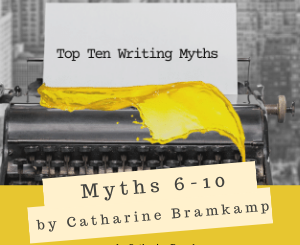Making Mistakes: Why We Should by Catharine Bramkamp
 Let’s welcome back monthly columnist Catharine Bramkamp as she shares with us about “Making Mistakes: Why We Should.”
Let’s welcome back monthly columnist Catharine Bramkamp as she shares with us about “Making Mistakes: Why We Should.”
***
I taught a four-week journaling class, and at their request, created a (unplanned) PDF from the slides along with additional material, turning the project around in a couple days.
I also created and scheduled a monthly meet-up. At the first meeting, Donna, one of the students arrived at the cafe, sat down and announced she found typos in the handout.
She was the first to find and announce my mistakes. She had won.
“It is not the critic who counts; not the man who points out how the strong man stumbles, or where the doer of deeds could have done them better. “
You have these critics in your life. We all do.
It is one of the biggest obstacles and frustrations for writers, and frankly, all creatives. Critics are righteous about being right.
They are confident where writers are timid. They are certain where artists have doubts.
Critics can be so terrifying creatives will simply stop creating anything just to avoid self- satisfied censor and negative comments.
We will work over an essay or a painting until holes are worn in the canvas and book chapters lose all color and light because we are so afraid of the critic, of making a mistake.
I thanked Donna and asked her to send me her list of my mistakes so I could correct them.
She replied, “Oh, there were just too many to count.”
In other words, she had no intention to helping, of moving a project forward. Her goal was to make sure that in this meeting, in this exchange, she was right and I was wrong. That’s it.
My own take-away was that I wasn’t completely crushed and demoralized.
Because after working on all sorts of projects and presentations I have internalized the assertion that “credit belongs to the man who is actually in the arena, whose face is marred by dust and sweat and blood. . .”
Gladiators are different from spectators.
Gladiators are different from spectators. What I have found is that those who work in the arena, covered in dust and sweat and blood, are much kinder to their fellow combatants.
When you know what it is like to create you are far less likely to criticize, and far more likely to be helpful and encouraging. And if you tend to be critical just to be right, here is your chance to change.
- Do you want to criticize, or do you want to dare greatly?
- Do you want to find fault or discover marvelous things?
- Do you want to demoralize or do you want to inspire?
- Do you want to experience “the triumph of high achievement. . . “ And if not triumph do you want to fail big “while daring greatly.”
When You Write You Are Daring Greatly
You are doing, not watching. You are starting something that no one else has ever dared begin, let alone saw through to the end.
I have written seventeen books — none of which made the best seller list, a couple of which have earned enough money for a double latte no foam. Doesn’t matter.
What matters to me is I finished them, published them, and own the effort. The work was glorious and life-changing. I emerged from the arena a different person, a better person.
Some readers are helpful and give me a list of corrections. Others dismiss the whole effort because they found mistakes.
(My mother’s comment on my recent book: “I found five typos.” That was the whole of her comments).
Do consider the source. Is the critic a fellow solider, a professional in your field? Has your critic done what you’ve done? Has he or she written a book? Submitted poems? Daily bled onto the page?
Because if not, well. . . .
If you are a writer, a creator, you have already won. Your daring, your effort guarantees that your “place shall never be with those cold and timid souls who neither know victory nor defeat.”
Poor Donna had never created. She never wrote, perhaps she never started her journal despite taking my class. When a person is busy finding mistakes, they don’t have time to make their own. That is a terribly cold place to live.
It is not the critic who counts
It is not the critic who counts; not the man who points out how the strong man stumbles, or where the doer of deeds could have done them better. The credit belongs to the man who is actually in the arena, whose face is marred by dust and sweat and blood; who strives valiantly; who errs, who comes short again and again, because there is no effort without error and shortcoming; but who does actually strive to do the deeds; who knows great enthusiasms, the great devotions; who spends himself in a worthy cause; who at the best knows in the end the triumph of high achievement, and who at the worst, if he fails, at least fails while daring greatly, so that his place shall never be with those cold and timid souls who neither know victory nor defeat.
Theodore Roosevelt – The Man in the Arena
***
***
ABOUT THE AUTHOR
When she’s not pulling her mother out of traffic, Catharine coaches and teaches fiction, non-fiction, and journal writing.
 Catharine Bramkamp is a successful writing coach bringing her clients from idea to published book and beyond. She has written 17 novels and 3 books on writing. Her poetry appears in over a dozen anthologies including And The Beats Go On (she was editor as well) and the chapbook Ammonia Sunrise (Finishing Line Press). Her current book, Don’t Write Like We Talk, is based on her co-producer experience creating 200-plus episodes of the Newbie Writers Podcast. She is the Chief Storytelling Officer for technical companies because everyone has a story.
Catharine Bramkamp is a successful writing coach bringing her clients from idea to published book and beyond. She has written 17 novels and 3 books on writing. Her poetry appears in over a dozen anthologies including And The Beats Go On (she was editor as well) and the chapbook Ammonia Sunrise (Finishing Line Press). Her current book, Don’t Write Like We Talk, is based on her co-producer experience creating 200-plus episodes of the Newbie Writers Podcast. She is the Chief Storytelling Officer for technical companies because everyone has a story.







Thank you. I needed to be reminded of this.
Amen to this article
Dee and Ian, I’m so glad!